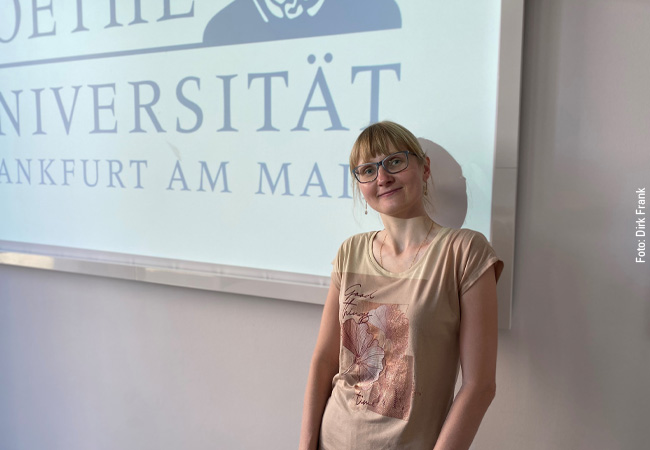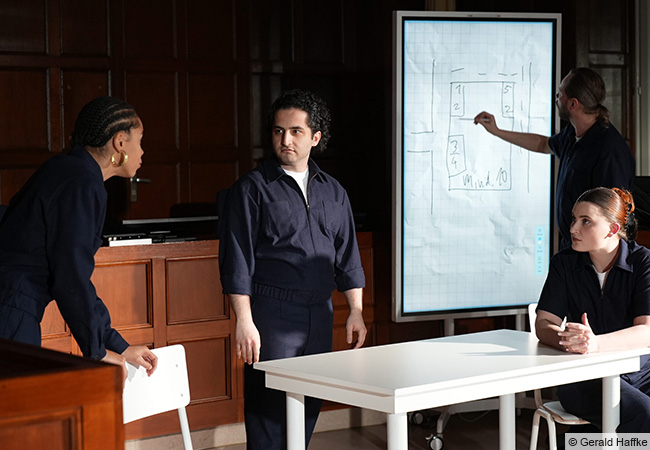
„We never thought this could really happen!“ Svitlana Potapenko is still stunned when she talks about 24 February 2022: the day Russia starts the war against Ukraine. On that day, the Ukrainian scientist still lives with her husband, a physicist with a PhD, and her son in a flat in the west of Kyiv. Potapenko, who teaches and researches at the National Academy of Sciences in Kyiv, is a native of the small town of Nizhyn, located northeast of Kyiv. „It is only 3 hours by car to the Russian border, so that day I immediately instructed my mother to get on the next train to Kyiv.“ When Svitlana Potapenko talks about ‚the war‘, she goes back to 2014, when the Russian army occupied the Crimean peninsula. „Since then, the country was already in a state of war.“
But that day in February changes everything. Potapenko and her family stay in Kiev for a few days, but then she decides that she with their son must leave Kyiv under the impression of constant shelling. „A colleague from Lviv offered us to stay in her house.“ She experiences the journey to Lviv, as very dramatic: overcrowded trains with people who have fear written all over their faces. Potapenko then stays with her son for a fortnight in relatively safe western part of Ukraine. A new plan ripens: she applies for a fellowship advertised by Prof. Birgit Emich as part of the DFG’s collegiate research group „Polycentricity and Plurality of Premodern Christianities“ (POLY). The application is successful, Potapenko is accepted. Now she sets off on an arduous journey west, which will take a total of three days, including a nightly stopover at Berlin’s main railway station. Potapenko has to travel alone with her son, because her husband is not allowed to leave Ukraine; men of military age are banned from leaving the country. „I hope that the Ukrainian parliament will relax the regulations somewhat so that scientists can travel abroad at least for a limited time, for example to attend a conference.“
Svitlana Potapenko hopes to travel to Ukraine with her son before the end of August in order to be reunited with her husband and family, at least for a short time. Despite the painful separation, she is happy to have found a fellowship and a place to stay in Frankfurt: „I am very grateful to Prof. Birgit Emich for the warm welcome. Her team found us a flat. After the troubled days in February, we can enjoy a normal and peaceful life here again. My son can attend kindergarten here and participate in 1st grade classes. This is a great chance for him to learn a lot.“ But Potapenko also stresses that the stay opens up the possibility for her to do research again, to push ahead with her projects. „In the first weeks of the Russian invasion, I had no peace at all to focus on my work and research.“ Potapenko is working on „The Axis Kyiv-Lviv and Beyond: Community of Interaction of Ukrainian Ecclesiastic Elites in the Mid-Eighteenth Century“ within the POLY project. This study, she explains, is a development of her earlier research on the intellectuals of the Ukrainian Church in the mid-eighteenth century and sheds light on their involvement in the broader European cultural networks of the time.
Methodological approaches that play a major role in POLY’s work have been incorporated here. But the research group also benefits greatly from the expertise of its Ukrainian fellows, says Prof. Emich: „Svitlana Potapenko’s work very impressively underlines the diversity that the Ukrainian space with its different religious formations and traditions has to offer. For historical research on religious plurality and its dynamics, the region is a treasure trove – for all of us at POLY, the cooperation with the Fellows is a great enrichment.“
Svitlana Potapenko thinks that the current situation in Ukraine is still very dangerous. „There are certainly many Ukrainians who are now returning to our country. But that is out of the question for us at the moment. Above all, I want to protect my son, because children suffer particularly from the permanent danger of air attacks,“ says Potapenko.







